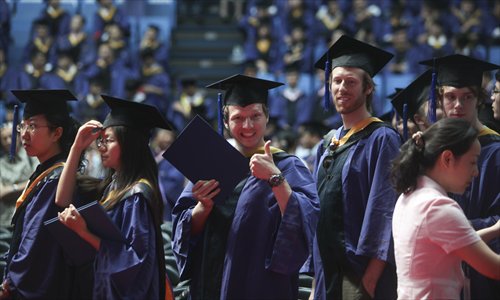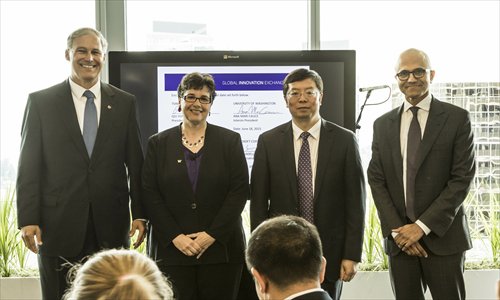Tsinghua University opening US campus, hosting $300m scholarship program

Overseas student at Tsinghua University's graduation ceremony in 2012 Photo: CFP

From left: Governor of Washington state Jay Inslee, University of Washington Interim President Ana Mari Cauce, Tsinghua University President Qiu Yong and Microsoft CEO Satya Nadella at the signing ceremony this June in Seattle. Photo: Courtesy of Tsinghua University School of Economics and Management
Tsinghua University, one of the best in China, is plunging into the world of international education after decades of sticking its toes in the water.
Chinese universities have been cooperating with international universities for over two decades. Dozens of Chinese universities have set up joint ventures with international universities, such as the University of Nottingham in Ningbo, the China Europe International Business School and Shanghai New York University.
But until now, China's elite Peking and Tsinghua universities have been slow in launching large-scale projects. Ideological concerns and administrative reforms dragged down the opening process of the two top universities.
But now that is changing, at least at Tsinghua. During Chinese President Xi Jinping's visit to the US, he presented the gift of a dawn redwood tree to the Global Innovation Exchange (GIX) during a ceremony at Microsoft headquarters in Seattle. GIX is a partnership between the University of Washington and Tsinghua University.
Because the GIX campus is still in the design and construction phase, Xi presented his gift to University of Washington Interim President Ana Mari Cauce, Tsinghua President Qiu Yong and Microsoft President Brad Smith. The tree will be planted after the GIX building is completed.
Tsinghua is the first Chinese university to build a physical campus in the US.
Many foreign universities are building a presence in China, but Tsinghua is reversing the trend by expanding into another country.
First in the world
GIX will initially offer a masters program and non-degree programs that will be recognized by both Tsinghua and the University of Washington.
Innovation is the core of this new venture and a key for both China and the US economy.
The two universities have equal power in setting curriculums, selecting teachers and students and other administrative issues. Tsinghua will bring its strengths into the US: computer science, design and business management.
The teachers at GIX will come from both universities. Tsinghua instructors will teach their courses in English.
"Tsinghua brings Chinese characteristics into the US. For example, if the US is to develop in the China market, students need to study Chinese design and Chinese consumer tastes. Courses on Chinese enterprises and entrepreneurship will also be offered to teach about the China market," said the team leader of Chinese side of the GIX project, professor Zhang Tao, who is currently the Party secretary of the Department of Automation at Tsinghua.
Microsoft provided $40 million. The ensuing funding will come from both US and Chinese enterprises and non-profit organizations.
Around 30 US, Chinese and other international students will be enrolled in GIX next year. Tsinghua has already selected dozens of potential students after a strict performance evaluation.
The University of Washington is responsible for the construction of the GIX campus. Tsinghua's architecture and art departments are offering advice for the design and construction of GIX buildings.
"GIX will be a multilateral open platform to cultivate young global leaders with technical talent, an entrepreneurial spirit, and social responsibility," said Tsinghua University President Qiu Yong this June in Bellevue, Seattle, during a signing ceremony.
GIX is expected to initially enroll over 100 new students each year. By 2025, it is estimated that more than 3,000 learners will be part of GIX.
"US universities are lead by actual projects. Tsinghua will encourage Chinese students to do projects for their academic evaluation instead of writing graduation papers," Zhang said.
GIX will be located on Seattle's east side in Bellevue's Spring District, a new urban development area in Seattle. GIX will be housed in a state-of-the-art facility that will feature computing and design labs, and prototyping and other facilities.
"American universities seek the best talent. That is why the University of Washington chooses to cooperate with Tsinghua. Because China has huge pools of talent," said Zhang.
This month, for the first time, the US News & World Report's ranking of global universities by subject area named Tsinghua University as the world's best university for engineering. It overtook the Massachusetts Institute of Technology for the top spot. The methodology for the ranking was mainly based on research citations and publications.
The success of Tsinghua is no accident. For the last 10 years, Tsinghua has adopted a strict academic evaluation system based on international standards. The evaluation system is applied to its engineering and science departments, and various humanities and social sciences departments. Some Tsinghua University teachers in the social sciences department told the Global Times that an evaluation based on research citations and international publications should not totally apply to humanities and social sciences, because social sciences are deeply rooted in Chinese language and traditions. Chinese humanities and social science instructors are calling for building a more balanced social sciences evaluation system with Chinese characteristics.
World comes to Tsinghua
As Tsinghua prepares to launch a university overseas, it also is readying itself to be the home base of an ambitious international scholarship program.
The Schwarzman Scholars program has been in development for over three years. The investment in this project is more than $300 million. Thousands of Chinese and US students applied for this scholarship, and 100 will be enrolled next year.
Pan Qingzhong, the executive dean of the Schwarzman Scholars, said he feels excitement and nervousness about the project.
"There are slogans painted 30 years ago still there next to the wall around my home. They include the words of Deng Xiaoping. 'Education should be modernized, should face the world, should face the future.' Deng Xiaoping said this in 1983. Thirty years later, Chinese universities still lack of courage to be integrated into the world," Pan told the Global Times.
Several years ago, a professor approached Stephen A Schwarzman, CEO and cofounder of Blackstone, a US private equity firm. They planned to raise $3 million for a chair in the Tsinghua University School of Economics and Management. Schwarzman reportedly said, "You ask for too little, you need to dream, dream big." He said he wanted to personally donate $100 million to establish Schwarzman scholarship program. The program has already raised more than $250 million, making it the single largest international-funded effort in China.
"China is no longer a course, it is the core course," Pan recalls Schwarzman as saying.
Grooming leaders
The Schwarzman Scholars one-year program aims to create a new path for the best and brightest in politics, business, technology and the social sciences.
"Tim Geithner, the former US treasury secretary, was a graduate of Peking University. He has strong feelings of attachment to China. We want to educate graduates such as Tim. Even Beijing Language and Culture University has graduates who have become foreign nations' presidents. The Schwarzman project aims to educate future premiers, presidents and leaders around the world," Pan told the Global Times.
Pan got his bachelors, masters and doctoral degrees all from Tsinghua. During the 1990s, he worked in Silicon Valley, California, for a startup company. The first project he did in Silicon Valley failed, and he and his partners lost $250,000, all their savings. After that, he launched another project, which was a success.
In 2004, his colleague persuaded him to return to Tsinghua's Economic and Management school launched by Zhu Rongji, former Chinese premier and former head of the school. Despite Zhu's senior government positions, he keep the position as honorary chairman of the school's advisory board. Each year, he returned to the school once, never missing a single annual meeting.
High stakes
The China-US Schwarzman team all have a strong will to build a top program. Pan's experiences in business have been useful. As an efficient project manager, Pan is skillful at dealing with daily operational issues. For the last three years, the biggest problem for Pan is communication.
"Mr Schwarzman sends long e-mails every day, whatever big or small issues. To respond to his e-mails requires a large amount of time," said Pan. "It's because they know too little of China."
Whatever the communication difficulties, trust between the two sides has been built up gradually. The Schwarzman office in the US has been undertaking the major task of selecting US teachers for the program. The Schwarzman office wants half of the teachers to be American. Pan has argued 70 percent should be Chinese.
Thousands of students from around the world have applied to be Schwarzman Scholars. Many Chinese students said they would give up full foreign scholarships for the chance to study at Tsinghua.
The biggest concern of the Chinese public is whether a one-year program can produce international leaders who identify with China. Pan said the Schwarzman program will encourage students to engage with a genuine China, through trips, internships at Chinese enterprises and other fields.
"We will even arrange for our international students to become county chiefs and township chiefs. It will let them know the basic administrative levels. After all, it is at the grass-roots level where the most vitality and creativity comes from," Pan said.
For both the GIX and the Schwarzman projects, the internationalization of Tsinghua is at stake. As Chinese President Xi Jinping once said, "We need to make friends with the world." Education is a natural way to make friends.
Newspaper headline: China exports Elite education